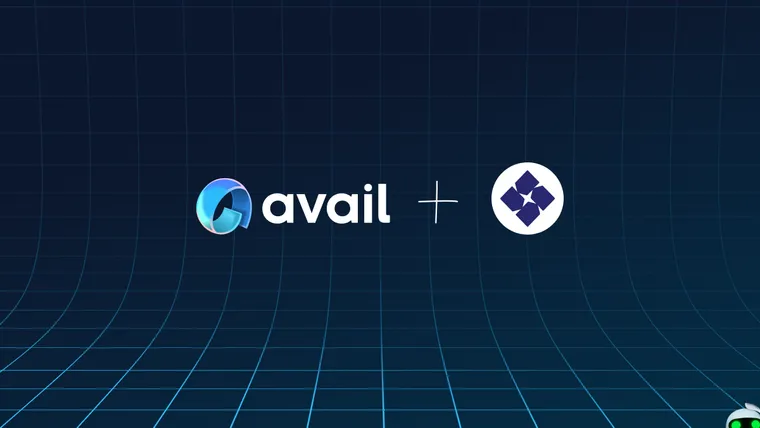TL;DR
- StarkWare will integrate with Avail to bring validity-powered appchains and L3s to the world.
- Madara Sovereign Rollups can achieve fast finality with Avail.
- You can begin experimenting with the Madara DA Interface today.
- Avail is live on mainnet.
Fractal Scaling with StarkWare & Avail
StarkWare’s fractal scaling vision built on recursive validity proofs all the way down the stack represents a promising design pattern for blockchain scalability and fast finality. With the development of a decentralized sequencer underway, Madara is set to become a critical piece of scaling infrastructure for the Starknet ecosystem. Pairing Madara with Avail's data availability blockchain, both of which are built on the Polkadot SDK and leverage recursive validity proofs, allows developers to build powerful ZK-based L3s. With Avail and Madara, developers can build secure, scalable, low-cost and decentralized blockchains that enable fast finality for end users.
L3 Fractal Scaling with Avail
StarkWare’s multi-layer thesis suggests that L2s provide a general purpose scalability layer on Ethereum while L3s provide a layer for customization. This allows low-cost experimentation on top of layer two. Developers then have the freedom and flexibility to deploy customized apps and explore different constructs without the need to build on top of Ethereum’s L1 directly. Avail’s data availability solution can be integrated to further optimize costs and performance on L3. L3s would settle to the Public Starknet on L2 prior to receiving hard-finality on Ethereum.
The Madara decentralized sequencer is promising to be a key piece of scaling infrastructure to enable all of this within the Starknet ecosystem. The aim of Madara is to increase the speed of transactions, while bringing down their costs, by leveraging the unique characteristics of recursive validity proofs.
Madara will also provide L3 developers with the option to utilize Avail for data availability.
- In Validium mode, Madara-based appchains and L3s can use Avail instead of the Data Availability Committee (DAC).
- In Rollup mode, state verification and DA verification could be done, providing soft confirmations, before settling on L1.
- In Sovereign Rollup mode developers can build Sovereign Rollups, a unique blockchain construct which settles transactions independently of a separate settlement layer.
- In Volition mode, end-users get to decide either Rollup or Validium mode for each transaction.
The Madara DA Interface
The Avail team has worked very closely with the Madara and StarkWare teams to build out the Madara DA Interface making it easy to integrate Avail’s DA layer with Madara chains. Using Avail as the DA layer for your Madara chain provides a number of benefits as Avail has been purpose built from the ground up specifically for this use case.
When using Avail as your DA layer, data posted to the Avail blockchain is extended through erasure encoding. This adds redundancy to the data and makes it harder for nodes to suppress. Avail generates KZG polynomial commitments of the submitted data and creates a ‘data root’ which is the root of the Merkle tree whose leaves are the submitted data blobs. This provides a footprint of the submitted data blobs in the block’s header.
Once a supermajority of Avail validators have agreed on a block, it is finalized using the GRANDPA finality gadget. The data availability is then guaranteed by the Avail network. The data root can then be used to show proof of inclusion of posted data within a finalized Avail block. Avail also supports data availability sampling which allows chains to confirm the availability of data without having to download complete blocks. You can learn more about Avail in the docs.
Madara Validiums with Avail
Avail powered Validiums improve the security assumptions and decentralization guarantees that are offered by DAC based Validiums. Instead of relying on a trusted group of parties, developers can send transaction data to Avail’s decentralized blockchain which is working towards supporting 1,000 external validators.
A Madara Validium built with Avail posts state diffs to Avail. Avail then returns a DA inclusion proof, proving the data was submitted to Avail properly and included in the blockchain. The Madara sequencer posts the inclusion proof to the L2/L1 chain where it can be verified.
Using Avail’s Vector Attestation Bridge the data root from finalized blocks is sent to a specific bridge contract on the target chain(s). The data attestations serve as proof on the L2/L1 that Avail’s validators have reached consensus on the data's availability.
Madara Sovereign Rollups with Avail
Given both Avail and Madara are built with ZK technology, Sovereign Rollups built on Madara with Avail will be able to provide DA guarantees to end users within ~1 min, with very low transaction fees.
In Sovereign Rollup mode, the Rollup nodes submit transactions to the Madara sequencer where they are batched and sent to Avail. Sovereign rollup nodes can verify both the execution and DA proofs locally, allowing them to settle transactions independent of a separate settlement layer.
Madara Rollups with Avail
Validating transactions on Ethereum for Starknet’s ZK-Rollups can take up to 8 hours to finalize but with Avail you can leverage pre-confirmations.
State diffs could be posted to Avail in addition to Ethereum. With this approach Avail’s blockchain validators can generate validity proofs to prove the data’s availability. The data availability proofs and execution proofs could be sent to the client, where they could validate transactions locally. As an example, a user could verify transactions from within their wallet, providing strong pre-confirmations prior to the 8 hour finalization on Ethereum.
The Road Ahead
There’s a lot of interesting and promising development opportunities to build powerful ZK based blockchains on the horizon by utilizing the unique characteristics of Starknet, Avail, and Madara. Ones where the benefits of recursive validity proofs compound as blockchain nodes verify both execution and data availability either on behalf of the blockchain network or by the client directly.
To begin experimenting, check out the Madara DA Interface, Avail Docs or come and speak with the team on the Avail Forum.
About Avail: Avail began as a project inside Polygon in 2020 and became a separate entity in 2023. The team is led by Polygon’s co-founder Anurag Arjun and former Polygon research lead Prabal Banerjee, and is set up to provide an industry leading data availability solution.


